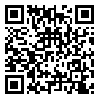BibTeX | RIS | EndNote | Medlars | ProCite | Reference Manager | RefWorks
Send citation to:
URL: http://jdisabilstud.org/article-1-1957-en.html
2- Department of Psychology, Ahvaz Branch, Islamic Azad University, Ahvaz, Iran
Abstract
Background & Objectives: The use of the Internet and cyberspace and social networks has a profound effect on the values of adolescents. Today, the needs previously met by the family are answered by this new media. Internet addiction causes various physical and psychological problems. One of the most important periods in the life of any person, which is associated with many crises and problems, is adolescence. The most important evolutionary aspect of this period is related to the formation and consolidation of identity. Some anxiety usually accompanies the search for identity. When the family is a safe base for adolescents, they confidently move towards finding their identity, begin to grow and strengthen. Positive psychology is interested in scientific research to fully and widely understand human experiences from deficiency, suffering, disease to prosperity, health, well–being and human vitality. The study was conducted to examine the effect of positive psychology therapy on the positive relationships between family and adolescents, Internet addiction, and identity crisis in high school girls in Falavarjan City, Iran.
Methods: This quasi–experimental study was performed with a pretest–posttest design with a control group. The statistical population included adolescent girls studying in the secondary school of Falavarjan in the academic year 2018–2019 and their parents. For this purpose, using multi–stage cluster sampling method, 40 high school girls in Falavarjan were selected and randomly assigned to the experimental and control groups with their parents (each group of 20 persons). The inclusion criteria were as follows: the ability to communicate with other group members, to be interested in participating in research, to be able to coordinate the class schedule with the meeting schedule. The exclusion criteria included not being able to communicate in the group, having a mental or physical disorder affecting the skills training process, and simultaneously participating in psychotherapy or counseling sessions elsewhere. The tools used consisted of the Revised Family Communication Pattern Scale (Koerner & Fitzpatrick, 2002), the Problematic Internet User Scale (Kaplan, 2002), and Identity Crisis Questionnaire (Salehi–Amiri et al., 2009). The intervention consisted of 8 weekly group sessions of positive therapy for parents and 9 weekly group sessions of positive therapy for adolescents. Data analysis was done using descriptive statistics (mean and standard deviation) and inferential statistics (multivariate covariance analysi) s in SPSS version 22 software. The significance level of the tests was considered 0.05.
Results: The findings showed that positive therapy was effective on increasing communication pattern of dialogue (p<0.001), reducing the communication pattern of conformity (p<0.001), the Internet addiction (p<0.001), and identity crisis (p<0.001). The eta squared of the intervention on increasing communication pattern of dialogue, reducing communication pattern of conformity, reducing Internet addiction, and reducing identity crisis were obtained as 0.70, 0.81, 0.77, and 0.82, respectively.
Conclusion: According to the results, positive therapy effectively improves family communication patterns, addiction to the Internet, and identity crisis in high school girls.
| Rights and permissions | |
 |
This work is licensed under a Creative Commons Attribution-NonCommercial 4.0 International License. |



